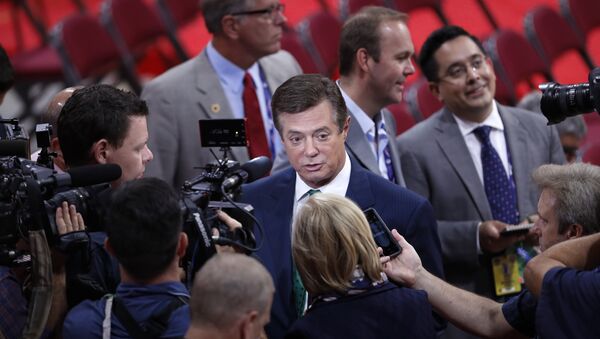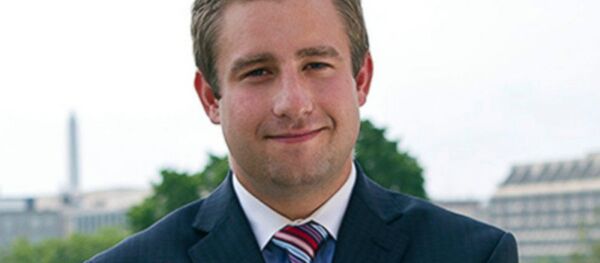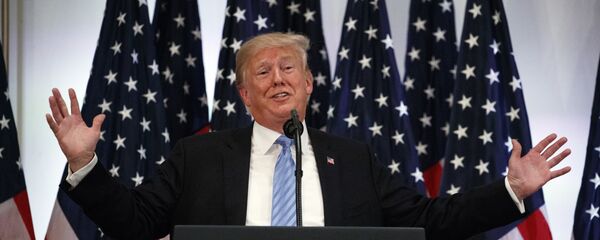The Times article on Tuesday is based on information from a court filing unsealed that day showing that Paul Manafort, Trump's former campaign manager, asked his associate in Ukraine, Konstantin V. Kilimnik, to pass information about Trump's polling numbers to Serhiy Lyovochkin and Rinat Akhmetov, two Ukrainians connected to the Ukrainian Party of Regions, the party of deposed Ukrainian President Viktor Yanukovych.
However, when one of the story authors, Kenneth P. Vogel, tweeted about the story Tuesday, he accidentally said that Manafort asked Kilimnik to pass that information not to Lyovochkin and Akhmetov, their Ukrainian business associates, but to Oleg Deripaska, a Russian billionaire sanctioned by the US government following his rejection of FBI attempts to "flip" him into an agent of theirs, as Sputnik has reported.
If that were true, it would indeed be quite the story. It still wouldn't vindicate the Russiagate narrative, since Deripaska is a man who despises Russian President Vladimir Putin and Manafort, both of whom have caused him no shortage of bad business, but in entirely different ways. The corrected Times article only says that Manafort might have hoped to curry personal favor with Deripaska, who he owed millions at the time, by offering him "private briefings," but never polling data.
CORRECTION: PAUL MANAFORT asked KONSTANTIN KILIMNIK to pass TRUMP polling to the Ukrainian oligarchs SERHIY LYOVOCHKIN & RINAT AKHMETOV, & not to OLEG DERIPASKA, as originally reported. We have corrected the story & I deleted a tweet repeating the error. https://t.co/xfnnr5KNQR
— Kenneth P. Vogel (@kenvogel) January 9, 2019
The newspaper's Twitter account later redacted the statement and tweeted a correction, but the eagerness to jump to conclusions that fit their preconceived narrative is worrisome. It's also far from the first incident of carelessly biased reporting by the mainstream media regarding Russiagate topics.
Let's take a moment to recall some of them.
On December 1, 2017, ABC's Brian Ross reported that Trump had directed former National Security Advisor Michael Flynn to make contact with Russian officials before the November 2016 election, when really Flynn was only asked to make such contact after the election. What a difference a single word makes!
Ross earned himself four weeks of suspension without pay for that mishap, after being forced to recant his error.
Only days later, CNN was forced to correct several dates in a story that made it sound as if the president's son, Donald Trump Jr., had played a role in the supplying of hacked Democratic National Committee emails to WikiLeaks.
An exclusive story December 8 reported that Don Jr., along with his father and other key Trump campaign officials, received a mysterious email on September 4, 2016, offering a website and decryption key for the hacked WikiLeaks documents. This heavily suggested that someone in the campaign was responsible for leaking a trove of stolen DNC emails to WikiLeaks, since that website published the emails on September 13.
However, CNN was soon forced to correct this story: It wasn't September 4, but September 14 — the day after the leak — that the campaign officials in question received the email. The network was also forced to change the date it reported Don Jr. had first tweeted about Hillary Clinton and WikiLeaks, which also happened on September 14, and not on September 4 as originally reported.
Pretty remarkable, considering that every network that reported it claimed they'd corroborated the information from "multiple sources." All those sources got the date wrong in the same way?
Only six months prior, CNN had been forced to correct another major report about Trump and Russia. In June 2017, the network retracted a story about ties between Trump officials and a Russian investment fund, a faux pas that caused three of the news agency's journalists to weigh anchor.
In September 2017 (wow, 2017 was a bad year for reporting on Trump and Russia!), almost every major US news outlet reported that Russian-government-backed hackers targeted the voting systems of 21 states during the 2016 presidential election. However, a senior Department of Homeland Security official corrected this before Congress, telling a House of Representatives panel that November that no attack had happened. Virtually no network reported this whatsoever, except for Sputnik.
Can you guess how many issued retractions? One less than the Times on Tuesday. At least we'll give NYT that. But it probably won't be the last time a major news outlet trips over their preconceived narrative of Russian collusion or interference.






